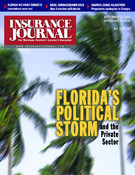From “Happy Days” to “The Perfect Storm” is how one Florida insurance executive describes her state’s defining years between 2003 and 2007 — and she isn’t talking just about the hurricanes.
Susan Straker, president of Coral Insurance Co., cited the hurricane law, House Bill 1A — created during a special legislative session in January — as “the classic example of why politicians should not get involved in the free market.”
She told her company’s tale at the Demotech/Insurance Journal Private Sector Summit last month in Orlando.
Straker said the most punitive part of the bill is that it forces companies like Coral into competition with state-backed Citizens Property Insurance Corp., which was originally the property insurer of last resort for coastal homeowners in hurricane-prone areas. Now Straker said the state-backed insurer is a “pay-later plan — one that it is “extremely exposed” to damages that the next major storm will produce.
Straker likens her Florida company to a “tadpole” in comparison to the larger carriers that she says are more affected by the legislation. Back in the “happy days” of 2003 when Coral was getting started, Florida looked like a good area to underwrite, according to Straker. Florida had gone 11 years without a major storm and the insurance market was in the black for the first time in 13 years. The state had strengthened its building code after Hurricane Andrew. The climate was attracting 1,000 new residents every day and the state’s tax burden was low. Also, the Internet was changing the way personal lines was underwritten, making it less labor-intensive.
“We looked at the market and saw insurers flourishing,” she recalls.
The company received its go-ahead in early 2004. The amount of competition caught Coral somewhat by surprise. Later the industry came to realize that many of these companies were under-reinsured, although they didn’t know that for sure until the end of 2004. “The year end was characterized by turmoil,” she said.
The industry also came to realize in 2004 that Citizens was overburdened. “We knew that our market of last resort was filling up and it was straining. We had heard stories that they were having difficulty settling claims and that people who were with Citizens were unhappy but we didn’t know to what extent our market would really be tested. It took 2005 to show us how bad it could get,” Straker said.
The year 2005 turned out to be the most devastating storm season of modern times. Four major storms hit the state: Dennis, Katrina, Rita and Wilma. “Wilma was the knockout punch for Florida and it was not that strong of a storm,” Straker said. “The result was again, we had a year that was characterized by turmoil and at this point it was pretty much a doomsday environment.”
Straker said there were public adjusters and blue tarps everywhere — and emergency orders.
“Probably all of you remember the fact that there was so much uncertainty in our market after 2004 and 2005, people were wondering what else could possibly happen next,” Straker told the Orlando gathering.
The Florida Hurricane Catastrophe Fund was a factor in companies’ planning and many carriers wondered when it would be depleted based on the two-year run on the resource. In 2006 it was no longer a mystery — the CAT fund was exhausted. There were carrier insolvencies, further increasing the burden on Citizens.
“We had those frenzied reinsurance renewals and the associated sticker shock which led to rate filings with the OIR (Florida Office of Insurance Regulation),” Straker said. “Consumers were complaining. They were looking at their tax bills and their insurance premiums and they were also looking to the Carolinas.”
Smaller companies like Coral could not issue blanket non-renewals. “We had to make it work and in doing so was at our own jeopardy,” Straker said. “We had to write a certain amount of premium to keep our doors open and yet we had doubled the aggregate for the premium we were writing.”
Straker explained that because of state-imposed reductions on businesses, the company’s aggregate remains the same even though premiums have been reduced to nearly half. “The risk of having your aggregate explode is very great and requires skill and constant monitoring,” she said.
There are other factors contributing to a “perfect storm” environment in Florida, including the “endangered housing market,” according to Straker. She said mortgage defaults went up 30 percent between the last quarter of 2006 and the first quarter of 2007.
“Hand-in-hand with an endangered housing market, you’ll find an emerging moral hazard because there are people who barely qualify for their home loans and they probably got more home than they could afford — it brings out undesirable behaviors,” Straker said. She said her firm has looked at reopened claims that have a “very strange smell to them.” In one week in July, Coral had eight grease fires in eight different homes in the same zip code — “that’s very scary.”
Straker doesn’t hide her disdain for public adjusters who she believes are part of the problem. She referred to the adjusters as vultures.
“I would like to suggest that when you take these vultures, you add to that the people who are facing foreclosure, you add to that the decrease in property values for honest people who just need to sell their house, you take an anti-free market approach from our legislature and then add to that six months of constant risk of another Hurricane Andrew, that HB1A is not the only problem we’re looking at. We’re looking at a perfect storm,” Straker said.
The silver lining, according to Straker, is that the new insurers entering the market that “have some real opportunities,” the greatest of which may be that they will be unencumbered by the assessments that the surviving established companies will have to face.
Topics Catastrophe Carriers Florida Windstorm Hurricane
Was this article valuable?
Here are more articles you may enjoy.


 What Analysts Are Saying About the 2026 P/C Insurance Market
What Analysts Are Saying About the 2026 P/C Insurance Market  AIG, Chubb Can’t Use ‘Bump-Up’ Provision in D&O Policy to Avoid Coverage
AIG, Chubb Can’t Use ‘Bump-Up’ Provision in D&O Policy to Avoid Coverage  Chubb CEO Greenberg on Personal Insurance Affordability and Data Centers
Chubb CEO Greenberg on Personal Insurance Affordability and Data Centers  After Falling 6% in 2025, Average Auto Insurance Cost Will Stabilize in 2026, Says Insurify
After Falling 6% in 2025, Average Auto Insurance Cost Will Stabilize in 2026, Says Insurify 


